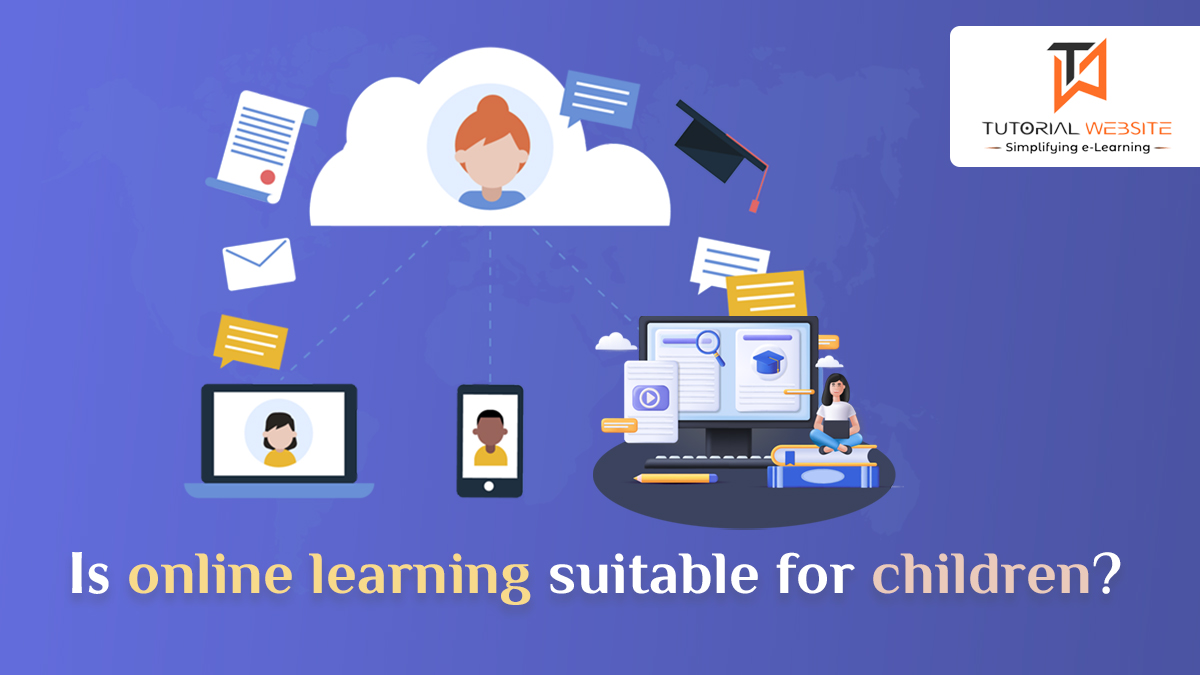Particularly with the advent of the pandemic, online learning, popularly known as e-learning, has gained much momentum very quickly.
Online tutoring is a form of education where students use the internet and digital technologies to access educational materials, communicate with teachers and classmates, and complete assignments and assessments. It can include online courses, virtual classrooms, webinars, and interactive educational games and simulations.
Suggested Read: How Will Technology Change the world in 2023
Is online learning suitable for children?
Ranging from the ease of access to practical sessions, online learning peaks with benefits in terms of output. Online learning can be suitable for children, but it depends on a variety of factors such as the age of the child, their learning style, the quality of the online program, and the support and resources available to them.
For younger children, online learning can be more challenging as they may need more adult supervision and support. However, there are many online programs and resources designed specifically for younger children that can be effective if used appropriately and with proper supervision. It’s important to ensure that online programs are of high quality and provide engaging and interactive learning experiences for children. Additionally, parents and caregivers need to be actively involved in supporting their child’s online learning and providing them with the necessary resources and structure to succeed.
It is important to note that online learning is not a one-size-fits-all solution and may not be suitable for everyone, depending on individual learning styles and preferences, one can decide to opt for either online or in-person tutoring.
5 Advantages of Online Learning For Kids
Flexibility: Online learning allows kids to learn at a child-favoring pace and on their schedule. This is especially important for children who have busy schedules or need a more flexible learning environment.
Accessibility: Online learning gives kids access to a wide range of educational resources and materials, including videos, interactive games, and virtual classrooms, which may not be available in traditional classroom settings. There is always material that is available to refer to for revision even if the child fails to make notes.
Personalization: Online learning can be tailored to meet the individual needs and learning styles of each child. This means that kids can receive personalized instruction and support to help them succeed academically. Best-suited tutors and teaching methods can be picked accordingly too.
Cost-effectiveness: Online learning can be more cost-effective than traditional classroom-based education, as it eliminates the need for physical classrooms, textbooks, and other materials. A lot of online tutorials and recordings are available free of cost and high-quality resources are charged meagrely on several websites.
Safety: Online learning can provide a safer learning environment for kids, especially during times of public health crises or natural disasters, as it allows them to learn from the safety and comfort of their own homes. The lockdown created a need for an alternate source of knowledge acquiring and online tutorials proved worthy during desperate times.
Also Read: Fintech Trends to be Ready for in 2023
Is Online Learning Suitable For Children – 5 Things to Know:
Online learning can be suitable for children, but it depends on their age and level of maturity. Children who are old enough to navigate technology and have self-discipline may find online learning to be effective. However, younger children may struggle with staying engaged or require more supervision.
Here are a few things to keep in mind while considering online learning:
Effectiveness of The Sessions
The effectiveness of online learning sessions depends on several factors, including the quality of the instruction, the engagement and participation of the learners, and the availability of technology and resources.
In general terms, online learning sessions can more or less be just as effective as in-person sessions, and sometimes even more effective. Online learning allows for greater flexibility in terms of scheduling and access to materials and can provide opportunities for personalized learning and feedback.
However, the success of online learning also depends on the level of student motivation and engagement. Learners must take responsibility for their learning, actively participate in discussions and activities, and seek help when needed. Instructors can facilitate this process by providing clear instructions and expectations, creating opportunities for collaboration and interaction, and providing timely and meaningful feedback.
Flextime & Screen Time of the Kids
Flextime refers to the flexibility in the scheduling and pacing of online learning sessions. This can be particularly helpful for children who have busy schedules or who may need extra time to master certain concepts. Flextime can also help reduce stress and anxiety related to rigid schedules and deadlines.
Screen time is an important consideration when it comes to online tutoring. While technology can be a valuable tool for learning, excessive screen time can have negative impacts on children’s physical and mental health, including eye strain, sleep problems, and reduced physical activity.
To address this issue, it is important to set clear limits on screen time and encourage children to take breaks and engage in other activities. Parents and caregivers can also consider using tools and apps to help monitor and manage screen time.
Resources Availability
Resources availability is a critical factor in the effectiveness of online tutorials. The availability of high-quality resources can help to support and enhance the learning experience for students.
Some of the resources that are commonly used in online tutorials include Digital textbooks and readings, Multimedia resources, Online assessments, Discussion forums and online communities, and Online tutoring support.
However, not all online tutorials may have equal access to these resources, and some students may face limitations in terms of their access to technology or internet connectivity. Instructors should be mindful of these limitations and work to provide accommodations and alternative resources where possible.
Online Tutor Costing
The cost of online tutoring can vary depending on a number of factors, including the subject matter, the level of the student, the length and frequency of sessions, and the qualifications and experience of the tutor. Some online tutoring services charge a flat rate for their services, while others may charge hourly or per-session rates. Some tutors may offer discounted rates for longer-term commitments or for purchasing multiple sessions in advance.
Generally, online tutoring tends to be more affordable than in-person tutoring, as it eliminates the need for travel and allows for greater scheduling flexibility. However, it is important to balance cost with the quality and effectiveness of tutoring services. It may be worth investing in a higher-priced tutor who has more experience or a better track record of success, rather than choosing the cheapest option available.
Convenience
Online tutorials eliminate the need for travel to and from tutoring sessions, saving time and money. This can be particularly helpful for students who have busy schedules or who live in remote or rural areas. One doesn’t necessarily have to spend extra time and resources traveling to places and can rather sit in the comfort of their home and attend sessions online with a reliable gadget and internet connection.
Further, it eliminates the need to take some time off other gigs as it allows one to schedule sessions according to the need and time available. Online tutorials also provide opportunities for easy and frequent communication between the student and tutor, through tools such as chat, email, and video conferencing. This can help to foster a sense of connection and support between the student and the tutor.
Conclusion
In conclusion, while considering online tutoring the above factors are to be kept in mind and the ability to focus without getting distracted would help one assimilate all the knowledge.

Nidhi Maurya is a professional blogger and Content Writer who writes about a variety of topics related to his niche, including Web Tech, SEO, and digital marketing.




